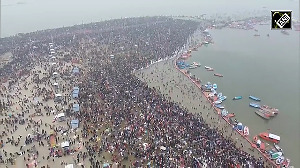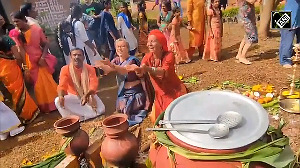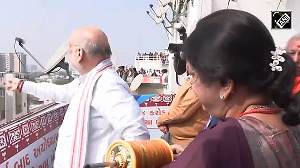Such a course would require a Constitutional Amendment, requiring two-thirds majority in both Houses of Parliament.
Even assuming that the INDIA combine comes to power next year, a two-thirds majority in the Lok Sabha could be way off the mark for them, observes N Sathiya Moorthy.

It may no more be an election issue for the ruling Bharatiya Janata Party at the Centre as the party may want to believe and also want the nation to believe.
But Monday's Supreme Court verdict upholding the abrogation of Article 370 can become a thorn in the flesh for the anti-BJP Opposition INDIA combine, beginning with their upcoming seat-sharing talks in Delhi on December 19.
The reasons are not far to seek. The INDIA combine partners from J&K would want a unified stand against the abrogation despite the Supreme Court verdict.
It they do not seek a review or a larger bench (for which the chances may be less than for the other), they may want the combine to swear by restoring status quo ante if they came to power.
The J&K partners in the INDIA combine too know the complications, but they cannot but be seen as making the demand on the combine.
The latter cannot be seen as side-stepping the same, either. The chances of the alliance appointing a high-level experts' committee and report back at the next meeting may be an immediate way out, but that is not going to end the agony in some, anguish in others and anxiety in a few more.
The reasons are not far to seek. If the Samajwadi Party, for instance, took objection to the Dravida Munnetra Kazhagam's Lok Sabha member, Dr Senthil Kumar, branding the traditional 'Hindi belt' as a 'gaumutra belt' because it hurts majority Hindu sentiments across the country, especially in north India, it may have to agree to consider similar sentiments pervading a reopened discourse on Article 370.
It pertains to 'Hindutva nationalism' of the BJP kind, which overlaps with the very same Hindu vote-bank of the BJP, whatever be the religious sentiments that influence the north Indian voter in public.
If anything, even more than Hindu religious sentiments, at times centred on Ayodhya, where a Ram temple is being readied for consecration ahead of the Lok Sabha polls, Article 370 is both about Hindutva politics and national security.
Or, that is the BJP-RSS narration that has found favour even outside the Hindi belt.
The public mood over the Modi government's 'Surgical Strikes' on ISI-backed terrorist bases in Pakistan occupied Kashmir still prevails, even if to a lesser degree.
Does the BJP as the ruling party have anything more to refurbish it all, is the question ahead of the Lok Sabha polls -- or, will one be required and justified?

Until proved otherwise, even an INDIA combine will have to assume that the Congress will play a pivot role in the matter if it came to power.
In government, the party will be torn between its commitment to Article 370 and the pragmatic approach to domestic and foreign policy hassles centred on the Kashmir issue.
The former line will mean that it would be justifiably defending the Nehruvian legacy, which has become a source of criticism bordering on ridicule at the hands of the BJP rival through the past decades and more so in the past nine years of the Modi government.
It will also be playing along with the continuing demand of the J&K allies.
However in a pre-/post-poll scenario, what is the likely mood of other INDIA partners?
Will anyone have any view other than restoration of the status quo ante? Will either or both sides then want their views articulated first in the December 19 discussions, and then in a common INDIA poll manifesto, if it came to that?

Independent of whichever party in an INDIA dispensation (if it came to that) gets the PM's post, home, external affairs and defence portfolios, their ideological position on the larger Kashmir issue, terrorism and larger national security and border disputes all would matter.
For the Government of India as an institution, to revisit an already settled matter with every change of government is just not on, though other aspects of the issue may be considered and acted upon for its domestic dimensions.
Of course, it can be argued that if the Modi government could abrogate Article 370, why can a successor government not restore the same?
Then, of course, the new law and restoration too could be challenged in the Supreme Court, under a different set of facts and circumstances.

There is a practical problem. Such a course would require a Constitutional Amendment, requiring two-thirds majority in both Houses of Parliament.
Even assuming that the INDIA combine comes to power at the Centre next year, a two-thirds majority in the Lok Sabha could be way ofF the mark for them.
In relative terms, it may be easier for the BJP, going by the past trends in 2014 and 2019 -- though there is a need to provide for 'anti-incumbency' in their case.
Granted that the INDIA bloc can muster up a two-thirds vote in the Lok Sabha, what about the Rajya Sabha, where the BJP could hold the government hostage for a long time just as the rest were doing for the Modi government?
It is difficult to imagine that non-INDIA, non-NDA parties will have a substantial number of seats in either House to be able to upset the apple-cart, as has been happening through the Modi regime.
Still, the last-mile hiccup is this. As per precedents and court rulings, the creation of a new state by merging the present-day J&K and Ladakh, which were separated when Article 370 was abrogated, too may require a resolution from the legislatures of the two Union territories.
Granting that there are going to be no elections there before the SC-fixed deadline of September 2024, the Government of India, through the good offices of the lieutenant governors (after sacking the present ones?), can choose that route to argue their case for getting a constitutional amendment passed without waiting for long.
It is again theoretical, as to which will come first, the September elections or a two-thirds majority in the two Houses of Parliament? Or, neither of them in the immediate future?
Yet, the Supreme Court has clearly ruled that Article 370 was only a 'transitional provision' due to 'war-time conditions' in J&K.
So, restoration of the scrapped J&K Constitution earlier available under Article 370 may become unviable.
Yet, re-merging the two Union Territories could still be a theoretical possibility -- a poor substitute, which the INDIA allies from those parts may be happy to do without.
Under Article 3 of the Constitution, merger of two or more states/UTs or creation of two or three out one requires only the two Houses of Parliament pass a resolution by a simple majority.
It does not tantamount to a Constitutional Amendment requiring two-thirds vote in the two Houses, as per Article 368.
Better or worse, it may still be too early to predict this early the public mood in Buddhist-majority Ladakh for a re-merger.
N Sathiya Moorthy, veteran journalist and author, is a Chennai-based policy analyst and political commentator.
Feature Presentation: Aslam Hunani/Rediff.com











 © 2025
© 2025